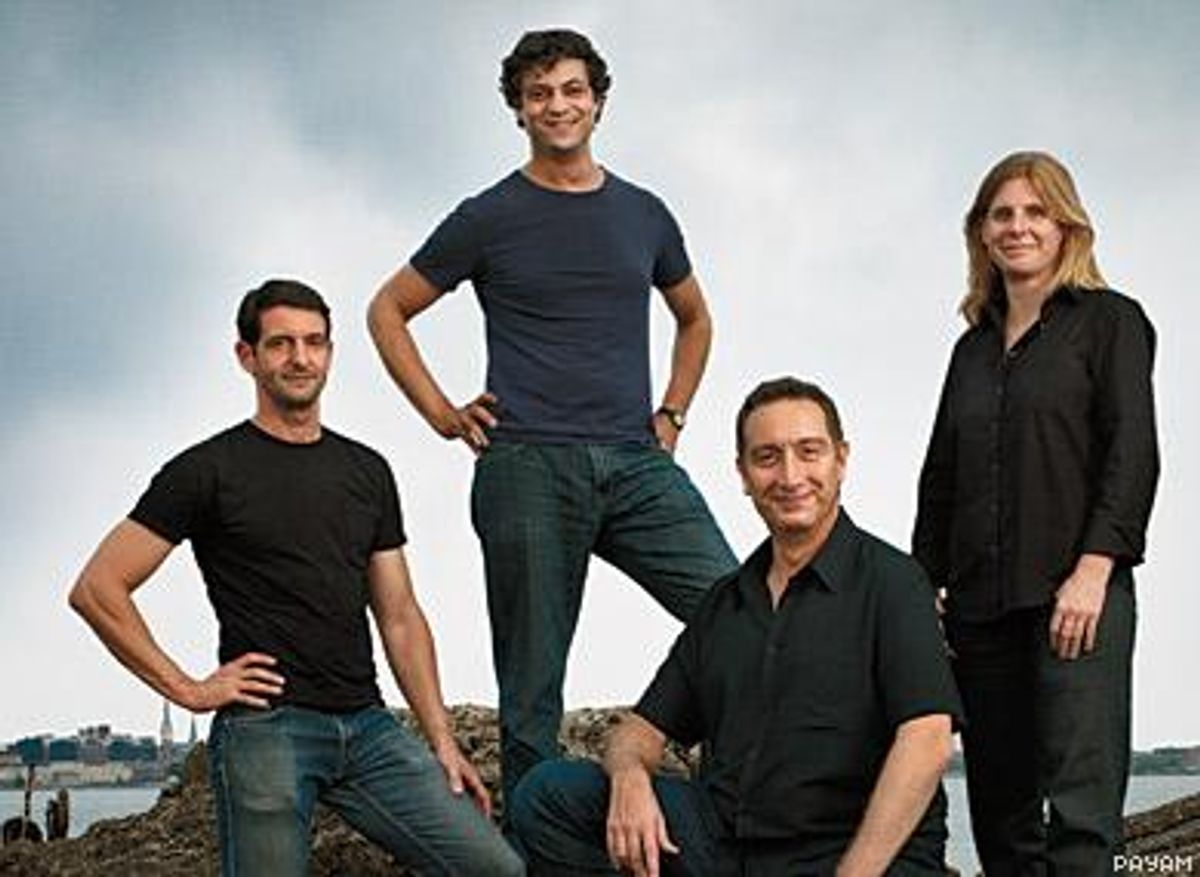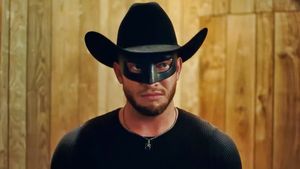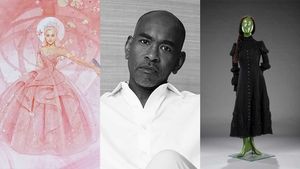CONTACTAbout UsCAREER OPPORTUNITIESADVERTISE WITH USPRIVACY POLICYPRIVACY PREFERENCESTERMS OF USELEGAL NOTICE
© 2025 Pride Publishing Inc.
All Rights reserved
All Rights reserved
By continuing to use our site, you agree to our Private Policy and Terms of Use.
At first it sounded like the premise for a bizarro-world reality show: Nine New York City actors, several of them gay, journey to Laramie, Wyo., just five weeks after the most notorious antigay crime in memory, the murder of Matthew Shepard. Their goal was to interview townspeople and write a play about the events of that October 1998. Two hundred interviews and a year and a half later, those accounts were melded to create The Laramie Project, "a play that portrays a town in turmoil," says Moises Kaufman, founder and artistic director of Tectonic Theater Project, the company that created the play.
Since its debut in Denver in 2000, the work has become one of the most-performed plays in high schools, colleges, and amateur theater groups, displacing such classics as You Can't Take It With You and Arsenic and Old Lace. It has been produced some 2,200 times and was adapted into an HBO film, exposing millions more to the story.
Last fall, as the 10th anniversary of Shepard's murder approached, Kaufman wondered aloud if there was something to be gained by going back to Laramie -- to see what, if anything, had changed in the past decade. The company members immediately signed on to the idea and, as they had in preparing the original play, flew to Wyoming and worked as a group to conduct interviews and develop the material into The Laramie Project: Ten Years Later (An Epilogue). The play will be staged on October 12 -- the 11th anniversary of Shepard's death -- simultaneously at more than a hundred theaters worldwide, including at Lincoln Center's Alice Tully Hall, where Tectonic Theater Project will perform. These performances will be accompanied by a national live online discussion where participants can blog, upload video and photos, and share stories about the play. Kaufman has said that by opening a play at different theaters on the same night, he is following in the footsteps of the Federal Theater Project, the New Deal-era program designed to employ out-of-work artists, writers, and directors and through which Sinclair Lewis's play It Can't Happen Here was produced simultaneously in 22 cities in 1936.
Like the original Laramie Project, Epilogue is a highly collaborative work, with Kaufman sharing writing credit with Greg Pierotti, Leigh Fondakowski, Andy Paris, and Steven Belber -- all members of the Tectonic Theater Project, which he cofounded in 1991. (Kaufman is now artistic director of the theater, whose best-known productions include Gross Indecency: The Three Trials of Oscar Wilde and I Am My Own Wife.) When the group returned to Wyoming in September 2008, it became clear that the work they'd completed there 10 years earlier had become an enduring part of their lives. "We've all stayed connected to The Laramie Project by visiting universities and talking to high schools and kind of extensively teaching and speaking around this," Fondakowski says. Moreover, Pierotti adds, "each of us, as we were doing the research for the original piece, established strong relationships with particular members of the community.... Each of us has maintained those relationships, so that was all alive and well when we were ready to come back."
The depth of those relationships led to what promises to be one of the most provocative parts of Epilogue: material based on Pierotti's interviews with one of Matthew Shepard's murderers, Aaron McKinney. Those interviews came about because of Pierotti's ongoing relationship with Father Roger Schmit, who was McKinney's spiritual adviser when he was in prison awaiting his trial. After Schmit wrote a strong letter of recommendation for Pierotti to McKinney, he agreed to an interview in prison.
When Kaufman, Pierotti, Fondakowski, and Paris first met with The Advocate to discuss Epilogue, they were just two days away from the first reading of the new play but still in the midst of writing and rewriting. They were reluctant to say much about the conversations with McKinney and how they would figure in the play. "I spent 10 hours with Aaron," Pierotti says, "and the scenes that I've made are trying to present the entire context of this conversation and not just a few sensational lines."
The fact that the interview took place at all is newsworthy. Under their separate sentencing agreements, both McKinney and his accomplice, Russell Henderson, were prohibited from speaking with the media -- a deal that unraveled in 2004, when ABC's 20/20 interviewed McKinney in the course of a much-criticized segment that argued that the murder wasn't a hate crime but a drug deal gone bad. "One of the things that I find very, very interesting is that in the theater we can have a gay man [Pierotti] going to interview Aaron McKinney," Kaufman says. And it will be that same gay man creating the theatrical moments from those interviews that will be seen onstage.
Even without Epilogue and its online components, The Laramie Project has already developed a life of its own beyond the theater. Especially when it's performed in high schools and colleges, it's been used as a starting point for community discussions about hate crimes, homophobia, and gender identity. "I'm careful about saying this without trying to sound pompous or vain about our work, but I think that this play really does what theater is perhaps best suited to do, which is talk to a community about a community," Kaufman says. "And I think people can relate to that."
Part of the play's afterlife has been that people portrayed in it -- including Shepard's mother, Judy Shepard, who founded the Matthew Shepard Foundation with her husband, Dennis, and son, Logan -- have been invited to speak to communities where it's been performed to discuss the issues it raises. (Another example of this theater-to-real life feedback loop can be found in the "God Hates Fags" Westboro Baptist Church, which demonstrated at Shepard's funeral and is also portrayed in the play. Church members continue to protest many productions of the play around the country, which often brings home the reality of extremist hate to the communities where it's produced.)
The Laramie Project deeply affects the lives of those who perform it or watch it. Acting in the play as an openly gay high school senior in Canton, Mass., is "one of the most important things I've ever done," says T.J. Leuken, now a first-year student at Lesley University in Cambridge, Mass. In addition to the production itself, there were in-school discussion groups and a school assembly at which Leuken and five other students spoke about antigay prejudice. The Westboro Baptists showed up as planned, and Leuken was profoundly moved when he saw one of his close friends, a straight woman, crying as she watched the demonstration and a silent counterdemonstration. "It wasn't just tough for people who were gay in school, it was tough for one of my [straight] friends," he says. "One of the issues we brought up was, What if it wasn't Laramie? What if it was here? What if it wasn't Matthew? What if it was me? That was really powerful."
It's more than coincidence that for years one of the staples of community theater, including high school and college drama departments, was Thornton Wilder's 1938 drama Our Town, a portrait of life in a fictional New Hampshire town told through the voices of its inhabitants. "We did in fact have Our Town very much in mind when we wrote The Laramie Project," Kaufman says. "In the stage directions for the third act we state that it must be performed with several chairs on one side of the stage -- just like the dead people inhabit the third act of Our Town."
Both plays present the complexity of life behind the seemingly placid exterior of a small town. In Our Town, especially in productions mounted over the past couple of decades, directors have tended to emphasize the darker currents that flow beneath the town's apparently cheerful surface. The Laramie Project, on the other hand, takes a story we thought we knew -- a place that many outsiders took to be a ground zero of evil -- and presents a much more complicated version of life there. As New York Times drama critic Ben Brantley noted when Laramie opened, "This play is Our Town with a question mark, as in 'Could this be our town?' There are repeated variations by the citizens of Laramie on the statement 'it can't happen here,' followed immediately by 'And yet it has.' "
That fundamental questioning is one of the reasons productions of the play often evoke controversy. "More often than I would have ever imagined, the play is banned, or the kids are told that they can't do it," Fondakowski says. "So it becomes this kind of thing that they can really rally behind to make a very strong statement about what kind of theater they want to make and what they want to say."
"Tell the story about the 'power lesbians,' " Pierotti says, which brings on some laughter from the three other writers, all of whom are actors as well. The actors nicknamed a group of young women in a Burbank, Calif., high school "the power lesbians" when their production of Laramie was banned last year -- and they didn't take no for an answer. They rehearsed on one student's backyard patio, and some members of Tectonic went to help them with the production. (The theater company has a $150,000 grant from the Arcus Foundation to support members in working with high school and college productions of Laramie all over the country.) Eventually, the Colony Theatre in Burbank donated the use of its 276-seat theater, along with costumes, props, programs, and help with sound and lighting.
These stories don't always end happily. Earlier this year an Oklahoma teacher was fired after showing the film version of Laramie and assigning the text of the play to one of her classes. "It's not a won battle," Pierotti says.
The play has resonated far beyond Laramie. When he was in a cafe in Laramie last September working on the Epilogue, an Englishman came over and asked if he was Andy Paris. It turned out that the Englishman was an actor named Adam Zane, and he and his just-wedded husband, Dick Longdin, were driving cross-country on their honeymoon. The Laramie Project had become a huge part of their lives four years earlier. "I'd kind of fallen out of love with acting," says Zane, a veteran performer whose credits include appearances in the original Queer as Folk. "There were only so many gay vets, gay doctors, and gay comedy sidekicks I could play!" But when he read Laramie he decided it was a story he had to tell, and he directed a performance of it by a group of university students near Manchester, England, in 2004. Zane then founded Hope Theatre Company in Manchester, where he lives, and its first production was The Laramie Project. He eventually set up Exceeding Expectations, a program to end homophobia through education, and wrote a play called Outloud about young people and sexuality. The company will present the U.K. premiere of the Epilogue in Manchester on October 12, and Paris will direct.
Closer to the scene of the original events, Plan-B Theatre Company in Salt Lake City will be presenting the Epilogue in a staged reading three days before the national event as a sort of preview. Plan-B has a strong connection to the play: It was the first company licensed to do its own production, in 2001. Producing director Jerry Rapier explains that Salt Lake City is the nearest large city for many Wyoming residents, which gave the original production a different kind of immediacy. (Their original production featured one of the characters in the play, actor Jedadiah Schultz, playing himself. He'll also be back to appear in the Epilogue.) "It really was community-based theater in the best sense of the word," Rapier says. "Getting people to talk about things they wouldn't otherwise -- maybe that's why it's so widely produced. It articulates things that people can't articulate on their own."
One can only expect that the Epilogue's answer to the question "What has changed in the past 10 years?" will be complex and multilayered and that the portrayal of Aaron McKinney will surprise and anger many. The town's response to the revisionist version of Shepard's murder -- that it was about drugs, not homophobia, a controversial theory -- will also be complex. "There are 27,000 people in Laramie. There are at least 27,000 Laramies," Kaufman said in a New York Times interview.
Eleven years after the events it first portrayed, the play continues to address "all the big pillars of what we consider that a democracy is built on," Kaufman says. "It's about equal rights and it's about justice and it's about truth." Epilogue, like the play it follows, is likely to have a life far beyond its multicity debut.
From our Sponsors
Most Popular
31 Period Films of Lesbians and Bi Women in Love That Will Take You Back
December 09 2024 1:00 PM
18 of the most batsh*t things N.C. Republican governor candidate Mark Robinson has said
October 30 2024 11:06 AM
True
These 15 major companies caved to the far right and stopped DEI programs
January 24 2025 1:11 PM
True
Latest Stories
Transgender Texans refuse to be erased as Republicans try to make their existence illegal
March 26 2025 7:17 AM
True
Parents call out school board member for anti-LGBTQ+ posts
March 25 2025 12:56 PM
Judge reinstates nationwide stop to Trump’s trans military ban
March 26 2025 7:07 PM
Ask Auntie: Reflecting on my trans journey toward visibility
March 26 2025 7:00 AM
Illinois Gov. Pritzker stands up for LGBTQ+ community in fiery HRC speech
March 25 2025 3:40 PM
Missing gay Arizona yoga instructor, Marcus Freiberger, found dead after blind date
March 26 2025 8:50 PM
Trump executive order targets law firm challenging anti-trans policies
March 26 2025 12:13 PM
New texts reveal Trump’s MAGA children were playing war games on their phones
March 26 2025 6:36 AM












































































